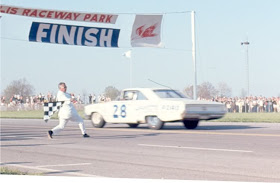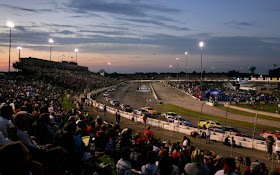
Update: Originally published on 7/12/09
It was 2006 when the details of the new NASCAR TV contract were released. In addition to the final seventeen Sprint Cup Series races, ESPN was going to be televising the entire Nationwide Series beginning in 2007. It was a wonderful opportunity.
ESPN President George Bodenheimer praised the series as a diamond in the rough that would be polished by the single-minded attention of the NASCAR on ESPN production team.
Friday night, TV viewers saw just how polished the coverage of the Nationwide Series has become as ESPN televised the race from Chicagoland Speedway.
It was NASCAR TV pro Allen Bestwick who led his team of Rusty Wallace and Brad Daugherty through the pre-race show. Bestwick used his pit reporters to offer interviews with selected drivers and let Wallace and Daugherty crank-up the enthusiasm. Then, the race coverage began.
At Chicagoland, the field gets strung-out and it is up to the TV network to scan the track for racing and storylines. Right from the start, the production approach was a familiar one. Tight shots of selected Sprint Cup Series drivers were mixed with in-car camera shots to create yet another forgettable telecast.
Quite simply, it feels like ESPN has given up on the Nationwide Series and is patiently awaiting the network's return to the Sprint Cup telecasts. This monochromatic approach is led by Jerry Punch, who once again rattled off car numbers and driver names while leaving any attempt at excitement to analysts Andy Petree and Rusty Wallace.
These telecasts are led by the producer, who instructs the director on how to present the race and then leads the talent through the live event. Quite simply, nothing was shown on the TV screen for the vast majority of the race except camera shots of single cars. There was a lot of zooming on this telecast and none of the cameramen were zooming out.
When the pit reporters took a moment to recap the top ten, it was as if TV viewers were being introduced to teams that they had never seen before and would probably not see again. Where ESPN is concerned, the Nationwide Series is about Sprint Cup drivers and nothing more.
There is a fundamental belief that what TV viewers should be seeing at home the vast majority of the time is what the fans in the stands at the race are watching. It was highly doubtful that fans were cupping their hands around their eyes to watch either Joey Logano, Kyle Busch or Carl Edwards one car at a time.
The "racing perspective" was never established and the stories of all the teams on the track were never told. As TDP has said for the past three seasons, NASCAR races are not about who is leading at lap 50 when there are hundreds of laps and several fuel runs left in the event.
Regardless of the driver names, the Nationwide Series teams all deserve TV coverage and not just a mention in passing. Good racing in the middle of the field is more interesting than single-file cars holding the top five positions. How has this not translated itself to the ESPN production team three years into this TV coverage?
Give credit to Petree and Wallace who tried with all their might to inject some excitement into the race. When they paused in their commentary, however, the emotionless monotone of Punch continually sucked any energy from the telecast. Even two hours into the race, Punch was still offering car numbers, driver names and lap counts.
How can it not have sunk in to ESPN that every Nationwide Series team running the entire race needs an opportunity to be on national television? In a multi-hour event, this should not be a problem. It seems ironic that ESPN took the time to discuss Brad Daugherty's team starting and parking, yet never took the time to show the other teams who entered to actually race.
Two moving sports information tickers, fancy graphics and snappy video bumpers leading into commercial cannot take the place of telling the story on the track. Single car camera shots more suitable to practice coverage can never relate the story of where that car is on the track and what is actually going on in the race.
Next Saturday night at 9PM, ESPN will telecast the Nationwide Series stand-alone race from Gateway International Raceway near St. Louis, MO. It is the final event before ESPN starts coverage of the Sprint Cup Series. The race is in primetime and should have a strong field.
This will be an outstanding opportunity for ESPN to change the superficial coverage of this series and work hard to get the remaining TV viewers to continue watching down the stretch.
Fundamental lessons learned from the TNT coverage this summer include keeping a broader perspective, moving through the field to find the racing and telling the stories of the event as they unfold regardless of the driver's popularity rating.
TDP welcomes your comments on this topic. To add your opinion, just click on the comments button below. This is a family-friendly website, please keep that in mind when posting. Thanks for taking the time to stop by The Daly Planet.





